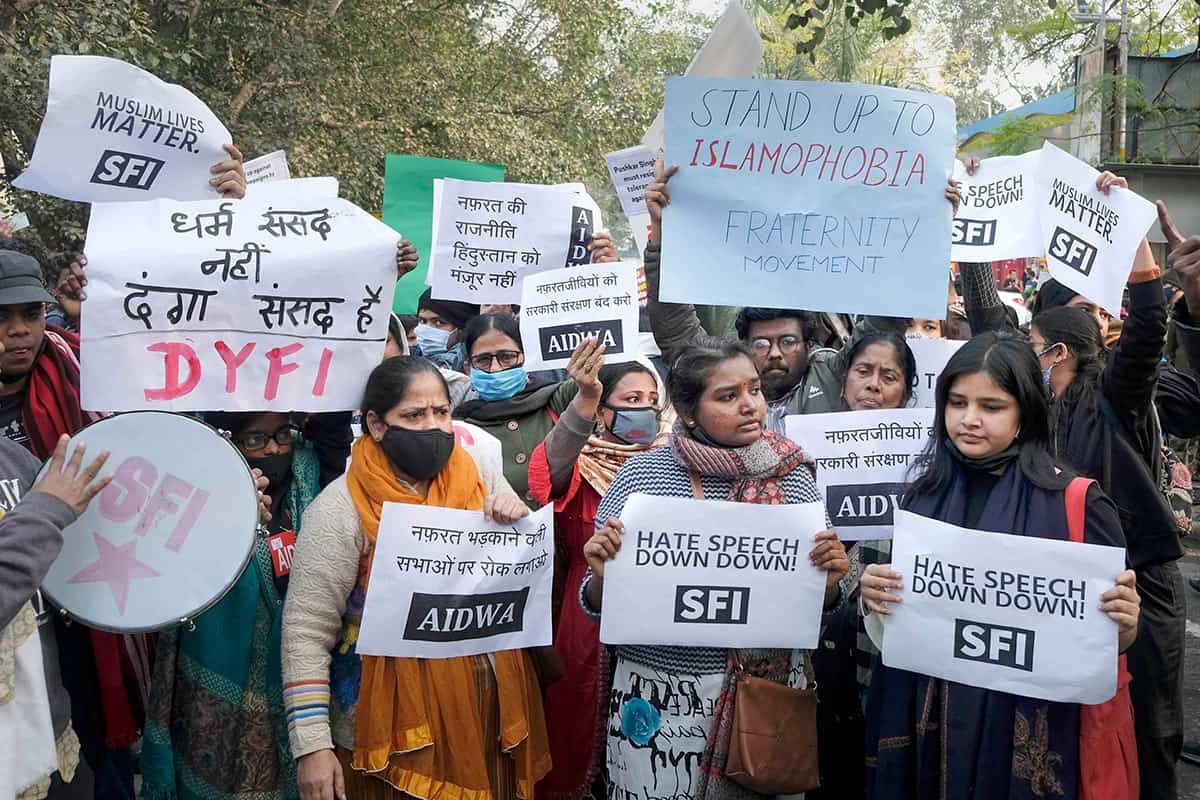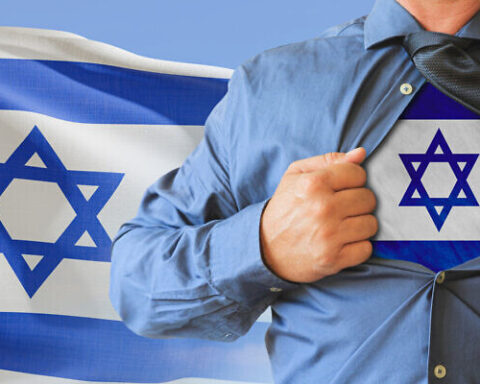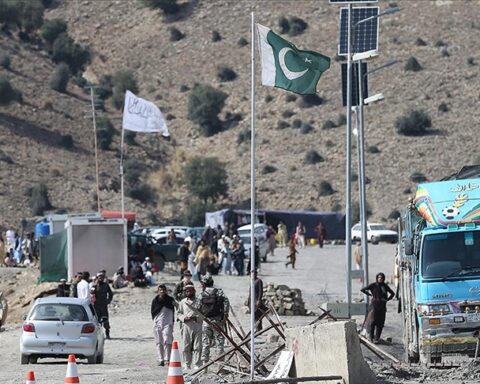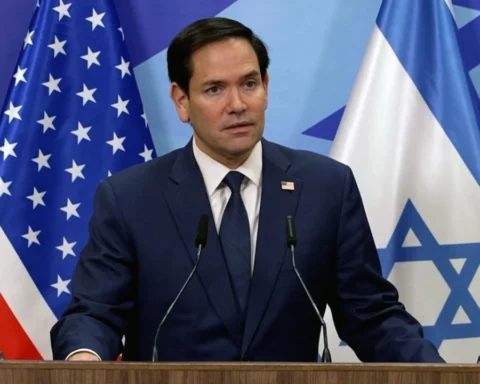Since 2014 when the BJP came to power, there has been increased repression of protests, particularly those led by Muslims or aligned with a cause like Gaza, writes Betwa Sharma.
While accepting the Orizzonti best director award at the Venice Film Festival, Anuparna Roy, the first Indian to do so, closed her acceptance speech by urging people to care about what was happening to the children in Palestine.
“Every child deserves peace, freedom, liberation, and Palestine is no exception,” Roy said. “I don’t want any claps for this. It’s a responsibility to think for a moment, to stand beside Palestine. I might upset my country, but it doesn’t matter to me anymore.”
It may seem surprising that Roy anticipated criticism for stating that all children, including those in Palestine, are entitled to peace, but she was right.
Rather than applause for her historic win, almost immediately, a barrage of criticism followed accusing her of ignoring other issues: U.S. tariffs imposed by President Donald Trump, the terrorist attack on Hindu tourists in Kashmir in April, Hindus killed in Bangladesh, and the Oct. 7 Hamas attack in Israel.
Of course, it is utterly foolish to compare starving children to trade disputes. Yet, Roy’s apprehension was entirely justified, given the intensifying Islamophobia since Prime Minister Narendra Modi and the Bharatiya Janata Party (BJP) came to power in 2014.
Repression
Since then there has been an increasingly repressive response to protests, particularly those led by Muslims or seen aligned with a Muslim cause like Gaza and any viewpoint the government considers unfavourable — including expressions of solidarity with Palestine.
There have been only a few attempts to organise protests against Israel by students, civil society leaders, Muslim organisations and Left parties — sporadic, scattered and unsustained. It has been nothing like the protests in Western capitals, and nothing on a scale one might expect from the world’s largest democracy, home to over 200 million Muslims, which is the third largest Muslim population in the world, with an historic kinship with Palestine.
Indian authorities have detained pro-Palestine protesters, breaking up gatherings, restricting permission, and registered criminal cases, including under India’s anti-terrorism law — the 1967 Unlawful Activities Prevention Act (UAPA) — citing reasons such as threats to law and order, public nuisance, obstruction, and the absence of prior authorisation.
On the other hand, the few pro-Israel protests that have taken place, including by Hindu right-wing groups, have not faced comparable restrictions or legal action.
In parallel with the crackdown on dissent and the deepening Islamophobia within the country, Prime Minister Modi’s government has undertaken a marked shift in foreign policy, moving away from India’s historic legacy of solidarity with Palestine.
Ditching Palestine
Once driven by postcolonial kinship, the Non-Aligned Movement (NAM) and support for Palestinian self-determination (recognising the Palestinian state in 1988), New Delhi has pivoted towards the strategic pragmatism anchored in arms deals (India is Israel’s largest defence buyer), military cooperation, intelligence sharing, and expanding trade.
Amid the staggering devastation and death toll in Gaza, India and Israel signed a bilateral investment treaty this year. And Modi and Prime Minister Benjamin Nentanyahu have continued to show their personal regard and affection for each other.
India’s near-total pivot away from the Palestinian cause stands in sharp contrast to the diplomatic balancing act it has maintained with old allies, most notably in its ties with Russia.
Despite pressure and sanctions from the United States, New Delhi has carefully preserved its strategic relationship with Moscow, unwilling to fully align itself with Washington or place all its bets on a single geopolitical partner.
When it comes to Palestine, India sees little strategic incentive for any kind of balancing act. It maintains its diplomatic lip service to the two-state solution, a position that has become largely symbolic, but remains mostly subdued, even as Israel’s bombardment and “man-made” famine in Gaza spark an international outcry and is increasingly described as genocide by leading genocide scholars.
India’s voting pattern on the Gaza conflict at the United Nations has been cautious, supporting resolutions calling for humanitarian ceasefires and unconditional release of hostages, protection of civilians, peace negotiations, and settlement activity, but abstained from outright condemnation of Israel without reference to terrorism and the Oct. 7 Hamas attack.
India’s voting record on the Russia-Ukraine war shows a consistent pattern of abstaining on resolutions that address or condemn Russian actions.
A Pall Of Silence
In the heart of Delhi, just off the road from Jantar Mantar, the 18th-century observatory built by Maharaja Jai Singh II and a short walk from the colonial-era facades of Connaught Place, lies the city’s designated protest site.
From opposition to government policies and Supreme Court judgments to demands for women’s rights, LGBTQ+ equality, and fair wages for ASHA [Association for Social and Health Advancement] community health workers and self-help groups, this space has echoed with the voices of protest.
But the once-constant buzz of demonstrations that defined this stretch of Delhi for decades has quieted significantly.
Almost immediately after the Israel–Palestine conflict escalated and global opinion became polarised, Yogi Adityanath, a Hindu hardliner and the chief minister of Uttar Pradesh, India’s most populous state, made it clear that pro-Palestine posts and protests would face prosecution.
Authorities in Uttar Pradesh have arrested and filed criminal cases against individuals, primarily Muslims, citing Indian Penal Code sections like promoting enmity between groups and statements promoting enmity, hatred and ill-will.
While most criminal cases have been filed in states run by the BJP, similar action has also been taken in Karnataka, a state governed by the Congress Party since 2023.
The inability to protest against Israel has been particularly painful in Kashmir, the Muslim-majority region of Jammu and Kashmir that has experienced decades of insurgency and served as the flashpoint for two wars with Pakistan, where a deep sense of kinship with Palestine is strongly felt.
Civil liberties in the region have long been curtailed, but since the Modi government revoked its partial autonomy in 2019, public demonstrations, dissent, and critical media coverage have been suppressed, often under the threat of India’s anti-terrorism law, the UAPA.
Protesters in Kashmir are facing charges under UAPA, including members of the minority Shia community who raised pro-Palestine slogans at a rally during Muharram, the first month of the Islamic calendar.
Hindu Right’s Bond With Zionism
The Hindu’s right’s fervent alignment with Israel online — at times appearing more loyal than the king — has become a vehicle for expressing anti-Muslim sentiment.
According to data from the Narrative Research Lab, pro-Israel tweets outnumbered pro-Palestine tweets by 5:1 in a sample of 4,316 tweets. India also emerged as a key source of pro-Israel disinformation, with coordinated online activity amplifying false narratives.
Despite efforts to silence dissent, two major protest movements erupted early in Modi’s second term — one against a controversial citizenship law amid rising anti-Muslim sentiment, and the other by farmers from Punjab, Haryana, and western Uttar Pradesh opposing new agricultural reforms.
In both cases, protesters were vilified. The anti-citizenship law movement, led by Muslim activists, ended after communal riots and COVID-19. Police charged the activists with terrorism, sedition and murder, holding them without trial for years— sending a message that Muslim dissent will face indefinite punishment.
The Sikh farmers were also branded anti-national and linked to separatism, with support from the pro-government media. But this didn’t stick, partly due to the affluence and influence of the Sikh community and the Hindu right’s deeper investment in portraying Muslims as the primary enemies of the nation.
Ultimately, Modi conceded, repealing the new farm laws, before state elections in Uttar Pradesh and Punjab. With Muslims, however, there is no similar political incentive.
The BJP, a national political party, rarely fields Muslim candidates and does not actively seek Muslim votes, instead often centering its campaigns around Hindu-Muslim polarisation.
Disturbed by the vitriolic backlash to their daughter Anuparna Roy’s historic Best Director win at the Venice Film Festival, her parents said that instead of celebrating her achievement, many in India were intent on tearing her down.
Yet, so pervasive is the climate of anti-Muslim sentiment in the country that they appeared cautious not to be seen as defending them. They chose their words carefully, emphasising that Anuparna’s film spoke not about any specific group, but simply about children.
“She did not speak about any community. She spoke of every child in the world. She did not say anything wrong,” they said.
Roy, 31, has said, “I am going to use my voice to talk about everything that makes us uncomfortable.”
* Betwa Sharma is the managing editor of Article 14, the former politics editor at HuffPost India, and the former U.N./New York correspondent for the Press Trust of India.
CORRECTION: India has the third largest Muslim population in the world, not the second as was previously reported.
Source: https://consortiumnews.com/2025/09/30/gaza-sparks-global-protests-except-in-india/






